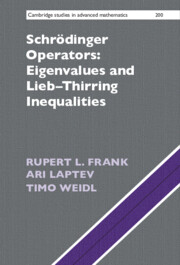Book contents
- Frontmatter
- Dedication
- Contents
- Preface
- Overview
- Part One Background Material
- Part Two The Laplace and Schrödinger Operators
- Part Three Sharp Constants in Lieb–Thirring Inequalities
- 5 Sharp Lieb–Thirring Inequalities
- 6 Sharp Lieb–Thirring Inequalities in Higher Dimensions
- 7 More on Sharp Lieb–Thirring Inequalities
- 8 More on the Lieb–Thirring Constants
- References
- Index
5 - Sharp Lieb–Thirring Inequalities
from Part Three - Sharp Constants in Lieb–Thirring Inequalities
Published online by Cambridge University Press: 03 November 2022
- Frontmatter
- Dedication
- Contents
- Preface
- Overview
- Part One Background Material
- Part Two The Laplace and Schrödinger Operators
- Part Three Sharp Constants in Lieb–Thirring Inequalities
- 5 Sharp Lieb–Thirring Inequalities
- 6 Sharp Lieb–Thirring Inequalities in Higher Dimensions
- 7 More on Sharp Lieb–Thirring Inequalities
- 8 More on the Lieb–Thirring Constants
- References
- Index
Summary
We discuss the problem of finding the optimal constant in Lieb–Thirring and Cwikel–Lieb–Rozenblum inequalities, thereby introducing, in particular, the semiclassical constant and the one-particle constants, which appear in the Lieb–Thirring conjecture. We discuss Keller's problem of minimizing the lowest eigenvalue of a Schrödinger operator among all potentials with a given L^p norm. We present the Aizenman–Lieb monotonicity argument, as well as semiexplicit computations for eigenvalues of the harmonic oscillator (including the counterexample of Helffer and Robert) and the Pöschl–Teller potential. In the one-dimensional case, we present the optimal bounds due to Hundertmark–Lieb–Thomas and Gardner–Greene–Kruskal–Miura. We provide two proofs of the latter bound, namely, the original one based on trace formulas and a more recent one by Benguria and Loss based on the commutation method.
Keywords
Information
- Type
- Chapter
- Information
- Publisher: Cambridge University PressPrint publication year: 2022
